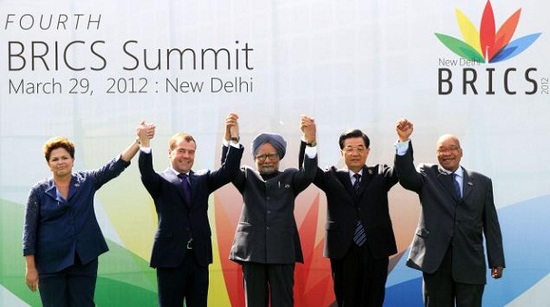Brazil, Russia, India and China owe a lot to Jim O’Neill, the Goldman Sachs economist who invented the BRICs investment category in 2001. Goldman Sachs’s 2003 report ‘Dreaming with the BRICs‘ succeeded in promoting a simple, powerful and ultimately irresistible narrative that summarized all the complex and exciting global changes investment bankers and policy analysts had observed for quite some time, yet hadn’t been able to articulate clearly. The report’s seemingly bold prediction that “in less than 40 years, the BRICs economies together could be larger than the G6” instantly caught on and defined the first decade of the new millennium. Aside from higher investment flows, the BRICS concept contributed to boosting its members’ political clout, and the BRICS members – Brazil, India and China in particular- can look back on a decade of unprecedented diplomatic visibility. O’Neill, in short, deserves a medal of honor from every single BRICs member country.
However, as the BRICS (with a capital ‘S’ since South Africa’s inclusion in 2010) seek to advance in their attempts to strengthen cooperation and jointly influence global affairs, they would be well-advised to forget Jim O’Neill. While acknowledging the British economist’s key role in the conception of the BRICs is important, policy makers in Brasília, New Delhi, Moscow, Beijing and Pretoria are now moving on and beginning to develop ideas that are far removed from anything O’Neill ever had in mind when he coined the term.
Since 2009, the BRICS have begun to rearticulate the concept that is now based on far more than the commonly shared characteristics of high economic growth and large market size. Aligned positions at the G20 and the IMF, a BRICS development bank, a BRICS stock market, yuan-denominated loans, talk about common investment rules and visa-waver agreements, strengthening cooperation on research and development and boosting ties between their respective civil societies are powerful examples of this unprecedented project of South-South cooperation.
Yet despite such progress, many policy analysts in the BRICS continue to stress the importance of the concept’s origin in their presentations, articles and policy talks on the topic. This is similar to talking about the Soviet threat to the West at a workshop about NATO’s future: The BRICS idea has developed into something entirely different and requires new thinking. Arguing that O’Neill’s parameters are still decisive to the existence of the BRICS concept is intellectually limiting and amounts to agreeing that it is no longer useful: After all, what made the BRICS concept stick in 2003 is no longer the case – the BRICS are no longer the fastest-growing economies, and Jim O’Neill himself has moved on and is now promoting new ideas such as the Next11, a group of smaller, but faster-growing countries.
Rather than exceptionally high growth, the common denominator among the BRICS today is a willingness to increase trade amongst each other, strengthening their voice in the global debate by developing joint positions in international institutions, such as the G20 and the IMF, and learning from each other on how to tackle domestic challenges such as inequality and poverty.
Read also:
Book review: “Brazil, the BRICS and the International Agenda”
BRICS: What’s in it for Brazil?
Book review: “The future of Power” by Joseph Nye Jr.
Photo credit: V.V. Krishnan









